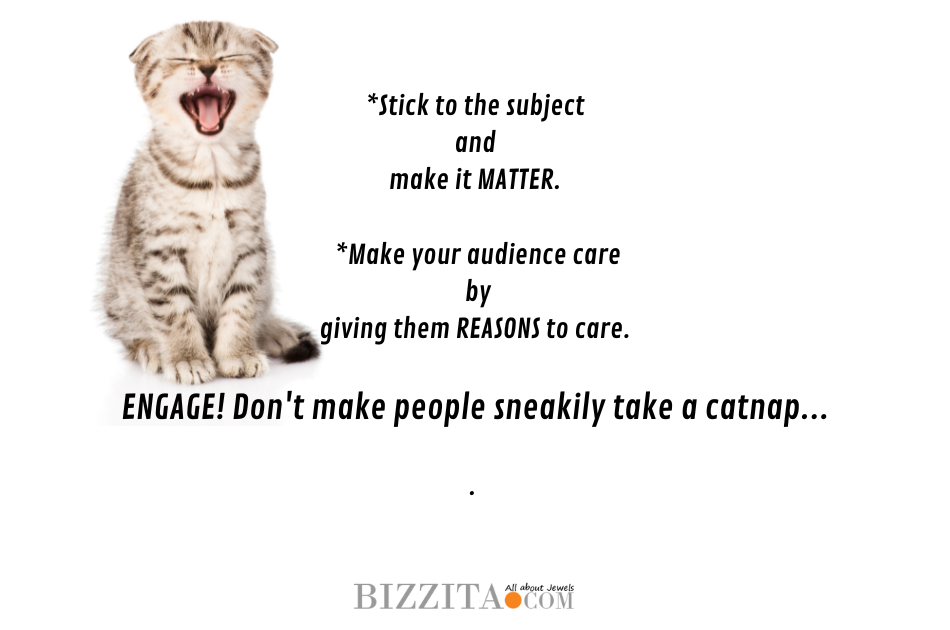ARE JEWELRY SHOWS MISSING AN OPPORTUNITY?
Jewelry shows offer a great opportunity of bringing together people and businesses. Is there room for improvement? Always. One of the things that matter to me is the missed opportunity of engaging audiences during talks and speeches. It could be so much better!
Experts talks, yes or no?
Experts in the room can be the most boring people, right? But why?
Maybe because excellent knowledge about their specific topic makes them enthusiastic insiders unable to get their ideas across to those who aren't experts.
Two common pitfalls:
1. Going into the matter way too deep.
2. Using (big) words and terms that make much sense to their peers but not so much to others.
On both occasions, their insights and ideas get lost by their inability to focus on the audience. Like Chris Anderson (Ted Talks) says it simply: it's not about YOUR (expert, brand, representative) language but THEIR language (audience, listener), referring to the many experts on his TED stage and the challenge to engage an audience to listen to their big idea.
Put a few experts on stage, and chances are they are happily chitchatting amongst themselves.
While for true insiders, this may be a joy, the chances are that the room during a jewelry show is filled with jewelers, diamond sellers, journalists, bloggers, consultants, representatives of trade organizations, a coral salesperson, an Indian rising jewelry designer, students, etc. They politely remain seated but doze off to their phones or look at their watches. However, they came in hoping to learn something new—a missed opportunity.
Highjacking the stage
Experts on stage holding a talk aren't the only ones struggling to keep the audience's attention. Every person that climbs up those stairs and takes a seat in the spotlight runs the risk of losing their audience's interest rapidly.
We have all been there, right? Trapped in a room, having to listen to someone highjacking the space. Whether the person on stage boasts about their accomplishments, bluntly throws opinions on us that are now proposed as facts, or loses themselves with endless anecdotes irrelevant to us, the listener.
The most challenging thing about going on stage is to resist the temptation to show our knowledge by touching on other subjects rather than sticking to the one thing we were supposed to discuss.

Make it all and only about the TITLE of the TALK.
Let's face it, your prospective audience on tradeshows is probably an eclectic mix of nationalities and various roles in the jewelry industry. And they want to connect, and they want to be entertained or informed, or both. Talks during jewelry shows are now a common and valuable practice. Something I talked about in this hot topic a few years ago.
READ ALSO: Has the end come for jewelry shows?
When we see a title that excites us, we hope, as a collective audience, to gain insights, inspiration, a fresh perspective, and a new idea. We hope to feel something perhaps of a shared moment with someone on stage getting a message across that lights a bulb in all our minds—a beautiful experience.
So here is a tip: stick to the subject and make it matter. Make your audience care by giving them reasons to care.
The fine line of authenticity
Being authentic is a marketing term that we can hardly escape from nowadays. Other than many jewelry brands struggling with the sheer complexity of this concept, there is a fine line too for speakers between authenticity and mere self-serving promotion.
And yet, when we listen to authentic content, we need no one whispering in our ear that THIS is a genuine speaker. No. We KNOW instantly, and we can't put the finger on it, but we engage and accept the content of the talk and the messenger, aka the speaker on stage. Try listening to Ken Robinson on Ted Talks. He is an exceptionally gifted speaker, but his message is utterly authentic as it is close to his heart, and he knows his subject very well.
Tip: A show should prepare an online portfolio of the speakers and their content instead of having speakers or panelists introduce themselves. The speaker's bio gives the audience information about the person and why they are a panelist or speaker.
Links to the speaker's books, websites, social media, and contact details should be included and easily clickable links so the audience can buy their books, contact them directly or engage with them on social media. Now, this speaker or panelist is not only adequately introduced but doesn't have to spend valuable time (ours and theirs) telling us why we should take them very seriously. We, the audience, know whom we have in front of us. Perhaps even create a (paid for?) option to view all speakers online on an owned channel.
Tip: If the jewelry show organizer doesn't pick up on that idea, keep the introduction as short and to the point as possible. As a jewelry show organizer, help speakers prepare with this or have someone to coach them.

What more can jewelry shows do to improve relevance and attention?
-
Our attention span is short. Very short. Why panel discussions of more than a full hour? It's too much unless the topic is controversial or extremely interesting to a broad audience. Keep it short, to the point, and relevant!
-
Topics are often too niche. Niche topics are lovely, but even the most niche topic should always give something to the listener. What can they learn from how you did something? In short: what's in it for the listener. As we mentioned before, make them care! Keep it also simple. One topic, one problem to tackle, a solution to one challenge...
-
Vulnerability. Why do people only mention successes in the presentation? They want to appear competent and successful in your eyes. We understand. But it's hard to relate to anyone who claims only their successes. Think about the storytelling opportunity here. A story starts with a given situation. A challenge is thrown upon us, and we go on a journey to battle that challenge. In the meantime, we undergo growth (personal), and the outcome is a different, hopefully, better new situation. This approach is what will engage an audience, this is relatable, and there is something to pay attention to, perhaps even learn something in the process!
-
There is a massive opportunity for shows that curate their speakers, talks, and presentations. We still all love to go to physical jewelry shows, but competition is growing, and habits and needs will change over time. What if there is a jewelry show that people actually want to go to because they KNOW they will learn so much. What if the show's value is not just the quality and quantity of exhibitors but also the astonishing number of speakers and their hot topics? What if we, as visitors, feel we cannot MISS the show?
Global jewelry shows
I intend to inspire and criticize with a constructive comment. If there are shows around the globe that are TED TALK perfect, they have nothing to worry about. But my experience is that I LOVE to learn, engage, and connect, and yet I see attention slipping away in the talks I attended. That is a waste of everyone's energy.
I see a HUGE opportunity for jewelry shows here. Let's share ideas, inspire, educate, grow and create an even brighter future for jewelry!

Leave a comment
![]()
© 2013 - 2025 Bizzita. All Rights Reserved
Legal Information | Copyright & Privacy Policy | Term & Conditions
